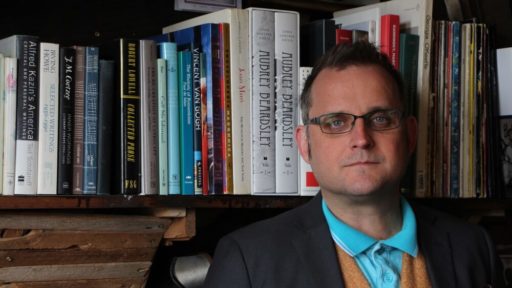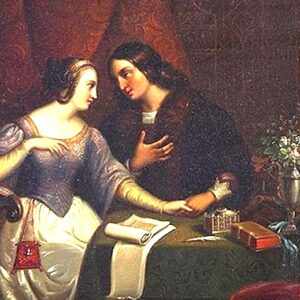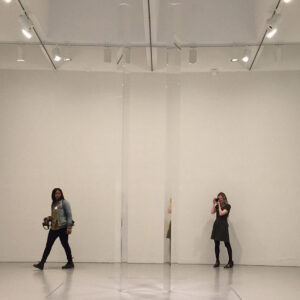We recently spoke with author Morgan Meis about his new Slant book, The Drunken Silenus: On Gods, Goats, and the Cracks in Reality
From what you say in the preface of The Drunken Silenus, it sounds like the writing of this book was accidental—that you found yourself in Antwerp and one thing just led to another. Did that give you a sort of freedom to follow wherever the train of thought seemed to lead you?
Yes, it was completely accidental. Actually, I wouldn’t even call it accidental since I actively resisted writing or thinking about Rubens. It just sorta happened, despite my best intentions. So, I’m not sure I would call it freedom either. I’m not sure I ever feel much freedom as a writer, or that I want to. More and more I find myself to be an old school Romantic. Writing happens to me, or through me, or something like that. Writing is the force, the writer is the vehicle of that force. At best. In the end, though, there is a sort of freedom in this experience of writing. Freedom from the self rather than freedom of the self. Provisional freedom. The self is pesky and hard to kill.
Your book deals with some pretty heavy philosophical issues but the writing is often light—in the sense that it is often funny, playful, and a bit, well, crude. Did you have to give yourself permission to do this or did it flow naturally?
I suppose the answer to this is an extension of the answer to the first question. When I am at my best as a writer, in my own opinion, is when the writing is happening faster than the person, me, is planning it. People these days like to say that writing is one percent inspiration and ninety-nine percent perspiration, or however the quip goes. I get the point. Writers work hard. I work hard. But still, in the end, for me, it is actually about inspiration, which comes from I know not where. The light but heavy style you are talking about developed over many years. I never planned it that way. It just comes out of me. Sometimes I am even appalled by my own crudeness when I see it on the page. But there it is. And in the end it feels right.
That said, I have studied, in my own non-rigorous ways, the writing of people like Joan Didion, Iris Murdoch, Thomas Bernhard, Emmanuel Carrère. Whenever I read writers like that, some part of my brain, or perhaps better said, my soul, is trying to soak up the lessons. What is the secret to a certain kind of prose? There’s a type of sentence that pushes at its own boundaries without quite losing itself. I don’t know how else to put it. There’s a certain kind of sentence and when I hit a sentence like that in someone else’s writing it stops me in my tracks. I go back to it again and again. I try to absorb that sentence, if that makes any sense.
You start off by looking at a painting by Peter Paul Rubens, an artist you say you didn’t even like. What are some of the challenges you faced trying to write about a visual artist from a long time ago? What makes for good writing about visual art?
I’m pretty sure that Rubens is one of the least popular “great artists of world history” around right now. Nobody talks about Rubens. People might mention something about his famously “fleshy” women and then the conversation ends. I don’t think it is clear to many people what his project was or why anything he painted is worth thinking about today. At a certain point, and I admit the perversity of it, this very fact became intriguing to me. I am also probably influenced by my wife Shuffy in this. Shuffy believes that every person, every single human being is completely and totally interesting. I think she really and truly believes this. And she acts that way with people. Maybe I semi-consciously directed that attitude toward Rubens.
So, I started to write about Rubens as a kind of personal challenge. I wrote about Rubens to see if I could write about Rubens. And then when I found out that I could write about Rubens, suddenly it turned into a need. I had to continue to write about Rubens and see how the whole thing would turn out. I tricked myself into it, basically.
As to what makes for good writing about visual art, it depends. Good scholarship is good scholarship. There is a place for academic writing. It’s just not what I am doing. I’m interested in looking at visual art and thinking about visual art as a stimulus for the creation of more art, in this case, literary art. I’m not saying this is what I’ve achieved, by the way, but it is what I’m trying to do.
A lot of philosophy seems to take place in an abstract, timeless sphere, bu you seem especially interested in concrete, historical events. What’s with that?
Well, I was trained philosophically at The New School for Social Research in New York City. The tradition there is to think of philosophy always as situated in time and place, as a reflection of the actual lived experiences of the persons doing the philosophizing. There is no such thing, as the saying goes, as the view from nowhere.
I’ll tell you a funny little story. I wrote my thesis on the aesthetic theories of Walter Benjamin, mostly as they are to be found in his odd and brilliant unfinished masterpiece, The Arcades Project. Benjamin’s whole task is to extricate and explicate forms of being “modern” from out of the actual physical structures of life as they were manifest in Paris of the mid nineteenth century. The Parisian arcades are thus the primary metaphor and subject of the book. It was only in finishing my thesis that I realized that most of the arcades Benjamin talks about, the ones that still exist, were the very arcades I wandered through as a kid spending the summer with my aunt in Paris. Basically, my big serious philosophy thesis was just a giant excuse to relive some of the most profound experiences of my life as a little boy.
The Drunken Silenus confronts some of the darkest aspects of existence, including mortality, tragedy, and the human propensity for self-destructive behavior. You don’t spare us—and yet you’ve written a book about all of that. Doesn’t the very fact of your writing about it mean you think there’s reason for hope?
I don’t think there’s reason for hope. Reason has nothing to do with it. I think there is hope. Hope exists. Hope is an irreducible component of the structure of reality, creation, whatever you want to call it. Hope also outstrips us, we cannot control it or understand it our make it what we want it to be. Hope is radical and wild as is the true divine, the divine properly understood. Or so I think most of the time. Perhaps one reason I am drawn to the darkest and most difficult things is because when you find hope hiding there, even amidst the horror, then you really know that God has some serious shit up her sleeve.





